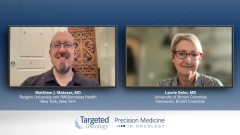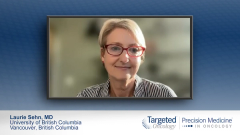
An Overview on the Nature of Follicular Lymphoma
Opening their discussion on follicular lymphoma, experts Matthew Matasar, MD and Laurie Sehn, MD, reflect on its indolent nature as a subset of non-Hodgkin lymphoma.
Episodes in this series

Transcript:
Matthew J. Matasar, MD: Hello, and thank you for joining this Targeted Oncology discussion entitled “Bispecific Antibodies for Follicular Lymphoma.” I’m Dr Matt Matasar. I’m the Chief of Blood Disorders at the Rutgers Cancer Institute of New Jersey, in partnership with RWJBarnabas Health [New York, NY]. Joining me today is my friend and colleague Dr Laurie Sehn. Would you please introduce yourself, Dr Sehn?
Laurie Sehn, MD: It’s a pleasure to be here. I’m Laurie Sehn. I’m a medical oncologist and hematologist. I’m in Vancouver, British Columbia, and my main focus is that I’m a clinical investigator and a patient care advocate for lymphoma.
Matthew J. Matasar, MD: Thank you so much for joining me, and thanks for joining us in this conversation. In today’s Precision Medicine in Oncology discussion, we’re going to be talking about treatment options for patients with follicular lymphoma and how to go about selecting the appropriate treatment based on patient and disease factors. Why don’t we go ahead and dig in. Dr Sehn, maybe you could kick us off and set the landscape in terms of follicular lymphoma, how we think about this illness, where it fits into the spectrum of B-cell lymphomas, and where we stand today.
Laurie Sehn, MD: Follicular lymphoma is a very common lymphoma that we see and treat in general practice. It is generally referred to as an indolent non-Hodgkin lymphoma. So we often use these behavior-descriptive terms like indolent or slow-growing, and it is the most common indolent non-Hodgkin lymphoma that we treat. Across the board, looking at all B cell non-Hodgkin lymphomas, it makes up about 30% of all newly diagnosed cases, so it’s quite common across the board. I have to say it continues to be a challenging lymphoma to treat. So, given that it generally presents indolently and behaves indolently, it means that patients can live for a very long time with their lymphoma. But to this day, it still remains an incurable entity with our standard management approaches. Although we have an increasing number of treatment options, the…the trick is going to be sort of, how do we manage patients over a course of a lifetime with follicular lymphoma, knowing that at this point in time, our current standard therapies are not necessarily known to be curative?
Matthew J. Matasar, MD: For me, this is sort of the challenge and the paradox of follicular lymphoma. We have this disease that is naturally so-called indolent, although it clearly covers a broad spectrum. Some patients have an indolent disease but can have a very aggressive clinical course. It’s a disease that by its nature is multiply relapsing, and every time we give additional treatment, you face new challenges, patients are more heavily pre-treated, and you have fewer options that you may be able to bring to bear, at least with currently available therapies.
Laurie Sehn, MD: The other challenge I’d just comment on is that this is still a very heterogeneous disease, and one thing we’re starting to understand more about is that there is biological diversity between patients. Although this is a very active area of research, currently, regarding the clinical tools that we have, they’re still not quite developed. So we understand that some patients will do better than other patients, some patients may not need treatment for long periods of time, some people respond very well to treatment, and other patients, despite the fact that we know this is in general indolent lymphoma, can present with more rapidly behaving disease, or present with clear treatment resistance and might have a poor outcome. So I think one of the major goals really is to be able to better measure the biological heterogeneity between our patients, so that we can hopefully select therapies that are more appropriate for them. Right now, unfortunately, those tools are sparse in clinical practice, but certainly we’re seeing some nice research describing the differences in the biological mechanisms that might be at play, and also possible future tools that we might use to prognosticate our patients.
Transcript edited for clarity.











































